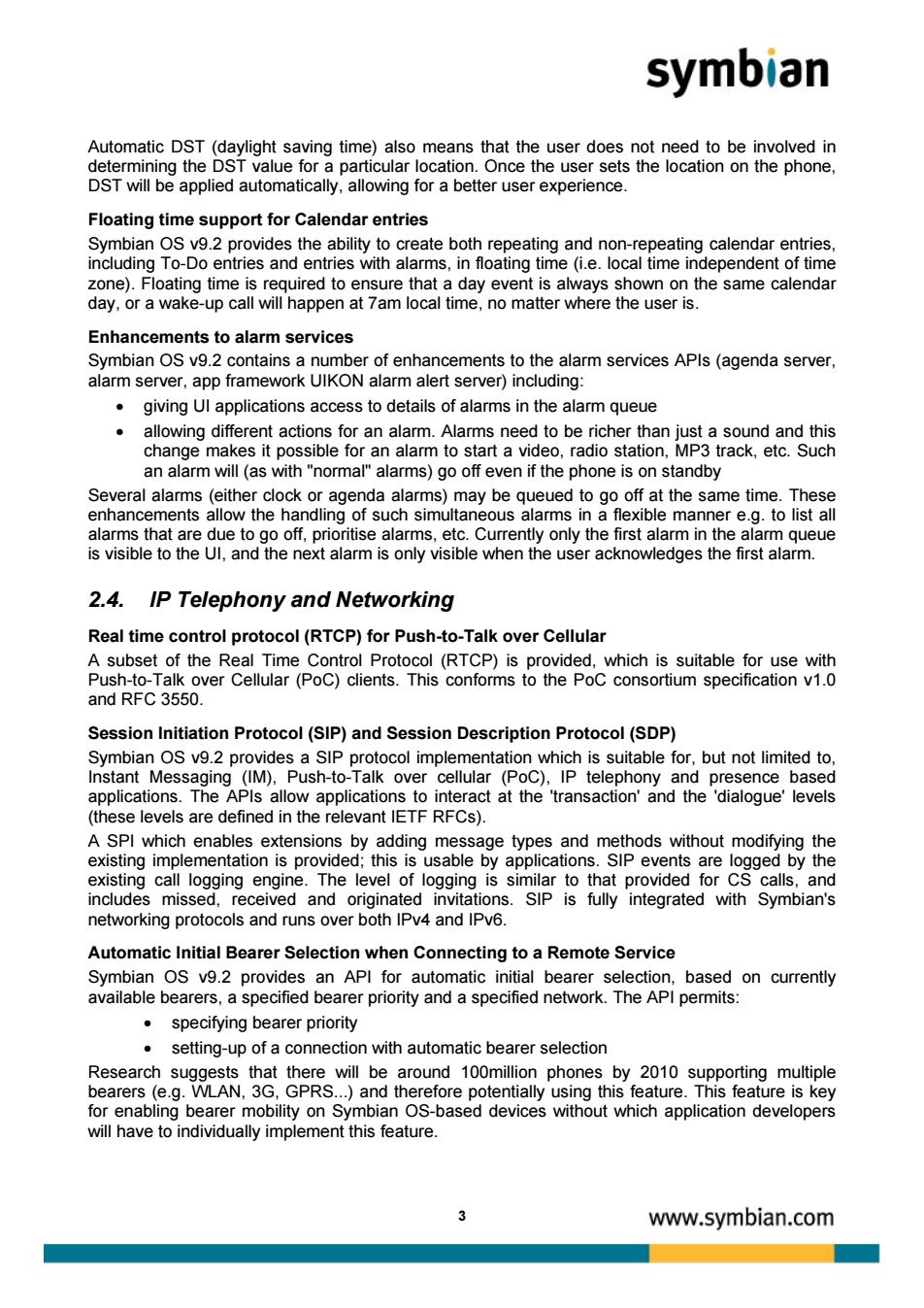正在加载图片...

symbian Automatic DST(daylight saving time)also means that the user does not need to be involved in Floating time support for Calendar entries Symbian v2 provides the ablity to create botcepeatingpeating calendar entnes 91 ent ms. endent of tim Enhancements to alarm services ses eueu o qnu e sue alarm server,app framework UIKON alarm alert serv giving Ul applications access to details of alams in the a alarm queue ns for an alarm.Alarms nee ed to be will (as with" ns)go off e even if the ph e is on standby h re.g.to list all alarms that are due to go off,prioritise alarms,etc.Currently only the first alarm in the alarm queue is visible to the Ul,and the next alarm is only visible when the user acknowledges the first alarm. 2.4.IP Telephony and Networking Real time control protocol (RTCP)for Push-to-Talk over Cellular of the real ntrol Proto suitable fo wit and RFC 3550. Session Initiation Protocol(SIP)and Session Description Protocol(SDP) Symbian OS v9.2 provides a SIP protocol implementation which is suitable for,but not limited to Instant Messaging (IM), Push-to vercellular PC).IP telephony and presence t at the 'transaction'and the th are in the relevant TF RFCs). whi enab ng e includes missed,received and originated invitations.SIP is fully integrated with Symbian's networking protocols and runs over both IPv4 and IPv6. Automatic Initial Bearer Selection when Connecting to a Remote Service Symbian OS v9.2 provides an API for automatic initial bearer selection.based on currently available bearers,a specified bearer priority and a specified network.The APl permits: specifying bearer priority setting-up of a connection with automatic bearer selection tentially for enabling bearer mobility on Symbian OS-based devices without which application developers will have to individually implement this feature. 3 www.symbian.com Automatic DST (daylight saving time) also means that the user does not need to be involved in determining the DST value for a particular location. Once the user sets the location on the phone, DST will be applied automatically, allowing for a better user experience. Floating time support for Calendar entries Symbian OS v9.2 provides the ability to create both repeating and non-repeating calendar entries, including To-Do entries and entries with alarms, in floating time (i.e. local time independent of time zone). Floating time is required to ensure that a day event is always shown on the same calendar day, or a wake-up call will happen at 7am local time, no matter where the user is. Enhancements to alarm services Symbian OS v9.2 contains a number of enhancements to the alarm services APIs (agenda server, alarm server, app framework UIKON alarm alert server) including: • giving UI applications access to details of alarms in the alarm queue • allowing different actions for an alarm. Alarms need to be richer than just a sound and this change makes it possible for an alarm to start a video, radio station, MP3 track, etc. Such an alarm will (as with "normal" alarms) go off even if the phone is on standby Several alarms (either clock or agenda alarms) may be queued to go off at the same time. These enhancements allow the handling of such simultaneous alarms in a flexible manner e.g. to list all alarms that are due to go off, prioritise alarms, etc. Currently only the first alarm in the alarm queue is visible to the UI, and the next alarm is only visible when the user acknowledges the first alarm. 2.4. IP Telephony and Networking Real time control protocol (RTCP) for Push-to-Talk over Cellular A subset of the Real Time Control Protocol (RTCP) is provided, which is suitable for use with Push-to-Talk over Cellular (PoC) clients. This conforms to the PoC consortium specification v1.0 and RFC 3550. Session Initiation Protocol (SIP) and Session Description Protocol (SDP) Symbian OS v9.2 provides a SIP protocol implementation which is suitable for, but not limited to, Instant Messaging (IM), Push-to-Talk over cellular (PoC), IP telephony and presence based applications. The APIs allow applications to interact at the 'transaction' and the 'dialogue' levels (these levels are defined in the relevant IETF RFCs). A SPI which enables extensions by adding message types and methods without modifying the existing implementation is provided; this is usable by applications. SIP events are logged by the existing call logging engine. The level of logging is similar to that provided for CS calls, and includes missed, received and originated invitations. SIP is fully integrated with Symbian's networking protocols and runs over both IPv4 and IPv6. Automatic Initial Bearer Selection when Connecting to a Remote Service Symbian OS v9.2 provides an API for automatic initial bearer selection, based on currently available bearers, a specified bearer priority and a specified network. The API permits: • specifying bearer priority • setting-up of a connection with automatic bearer selection Research suggests that there will be around 100million phones by 2010 supporting multiple bearers (e.g. WLAN, 3G, GPRS...) and therefore potentially using this feature. This feature is key for enabling bearer mobility on Symbian OS-based devices without which application developers will have to individually implement this feature. 3